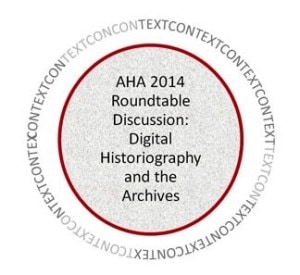The following series of blog posts is based on our session at the AHA meeting in 2014 on Digital Historiography and the Archives. We conceptualized the session as an interdisciplinary roundtable discussion. Short presentations by each panelist led to a rich and multifaceted discussion with the audience. Expanding upon this format and our engaged in-person discussion, we hope that this series of linked blog posts will serve as a virtual, extended roundtable. The full papers/comments will be published on the Issues in Digital History blog. Because it exists in the liminal, intermediary space between traditional conference session and formal publication, we imagine it as an experiment in new forms of “open source” scholarly communication. We will post our discussion papers in sequence with a concluding summary of the discussion that took place at the session itself. In sharing our work in provisional form, we encourage readers to continue this discussion on the blog by posting comments, ideas, reflections, and criticisms. If you wish to use this material in another place or venue, we ask that you contact each presenter directly for explicit permission to quote from the works presented here. The contact information for all presenters can be found at the end of this post.
The preservation, analysis, and representation of digital information in digital collections, archives, and other media poses complex, challenging, and often confusing issues for historical researchers, archivists, digital humanists, and librarians alike. Whether we even call these digital materials “archive” is at stake. We hoped to address some of these issues in the session, while also discussing some of the elements of a framework or vocabulary that can support a critical appraisal of digital information. In his 2011 article in the American Archivist, panelist Joshua Sternfeld introduced such a framework called critical digital historiography, which he defined as the “critical, interdisciplinary study of the interaction of digital technology with historical practice.”
All participants in the panel echoed Sternfeld in emphasizing how archival theory and practice need to be integral elements of such a critical framework, along with evolving historiographical and professional practices. The digital medium has challenged historians to expand their knowledge about archives, and understand their function in generating scholarship and knowledge. But what might be the key theoretical and methodological questions raised by digital archives or digital collections as they pertain to historical practice? What materials do archives collect and preserve, and why? Which materials are selected, and which are excluded? What are the driving forces and principles guiding the contextual information about collections provided by archives? Which political, social, economic, and cultural power relationships now structure the archives? These are the questions that archivists and historians might come together to confront in critical and productive ways.
Fortunately, not only has the digital medium unleashed a heightened awareness of established archival principles and historical practice, it has also introduced new lines of theoretical inquiry. Historians and archivists are both beginning to work with sources of varying scope, format, and provenance, thereby challenging both archivists and historians to reconsider the limits of historical inquiry, the contextualizing properties of metadata, the design of access systems, and the engagement of new audiences. In short, trends in digital scholarship and practices have contested historians’ very conception of “the archive” as well as the role of the 21st-century historian.
What became evident from the session was that historians must collaborate with information professionals, including archivists, to create critical contextual information for sources, reference resources, and repositories as well as new kinds of scholarly work that harnesses the power and registers the challenges of the digital archive, while serving a diverse community of users composed of researchers, educators, information professionals, students, artists, policymakers, and members of the public as a whole. The question is how? What areas of research should be explored and what methodologies and theories are already under development? We hope that this blog post can provide a catalyst, however brief, for a sustained discussion.
Links to individual presentations:
- Michael J. Kramer, “Going Meta on Metadata”
- Katharina Hering, “Contextualizing digital collections based on the principle of provenance and the tradition of source criticism”
- Joshua Sternfeld, “Historical Understanding in the Quantum Age”
- Kate Theimer, “A Distinction worth Exploring: ‘Archives’ and ‘Digital Historical Representations’”
Have questions or want to contact the authors?
- Michael J. Kramer (AHA Session Moderator) (mjk@northwestern.edu)
- Katharina Hering (khering23@gmail.com)
- Joshua Sternfeld (joshsternfeld@gmail.com)
- Kate Theimer (kate.theimer@gmail.com)
This post first appeared on AHA Today.
This work is licensed under a Creative Commons Attribution-NonCommercial-NoDerivatives 4.0 International License. Attribution must provide author name, article title, Perspectives on History, date of publication, and a link to this page. This license applies only to the article, not to text or images used here by permission.
